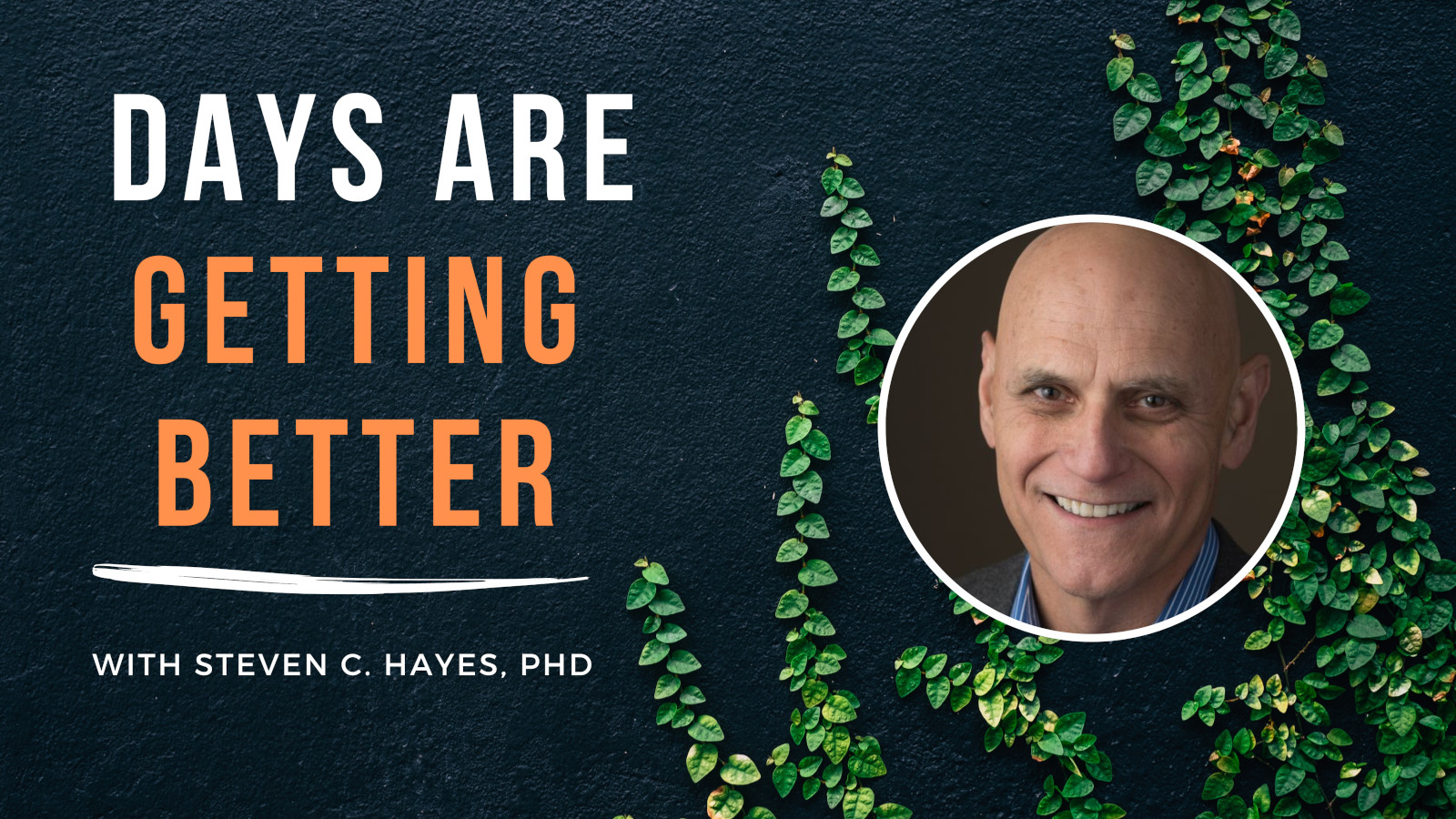Interest in acceptance, mindfulness, and values has exploded over the last several years. You can see the trend in the popularity of works by authors such as Eckhart Tolle, the visibility of the Dalai Lama, or the impact of Rick Warren. You can see it on this website if you watch for just a few weeks. People are being asked to come into better contact with the present; to be less attached, entangled and avoidant; and to focus more on purpose and meaning.These changes raise a question. Why now? None of these topics and approaches are new. They have been puttering along for decades, with notable periods of popularity (remember the Maharishi?). Why the resurgence of popularity? Some of the answers might be trivial. The children of the late 1960’s and early 1970’s are now in leadership roles, for example. Perhaps we are just witnessing a cultural echo from times past. Said more directly: the hippies are now in charge. As an old guy who probably spent more time in his youth than he should have hanging around Golden Gate Park in San Francisco in a somewhat altered state of consciousness I secretly think that reason has more truth to it than we want to admit. But that cannot explain all of it. Much of thie current interest comes from folks who would not know hippie hill from their tennis shoes. Some answers may be more substantial, such as the science that shows that these ideas are supported by a growing body of objective evidence. But I think the most profound reason is far deeper. These changes are more than what generational trends or even positive evidence can explain. I suspect it is because normal human beings need something right now – they yearn for something right now — that acceptance, mindfulness, and values may help provide. The human mind did not evolve for the present day. If you try to count up the number of words the average child was exposed to in the developmental period 200 years ago the number is not very large. Talks with family and friends don’t yield a huge number of words and books were a precious commodity. Whatever number you come to, children are exposed to several times that number just from television alone. Modern technology has create a fire hose of human language in the expansion of the communication media. Radio, mp3 recorders, cell phones, film, and computers are spouting a constant stream of images and sound, not to mention magazines, newspapers,and books. We can add to the cacophony by arranging for multiple inputs at the same time. It is not uncommon to be reading a magazine while watching TV, or listening to the radio while working on the computer. A Pandora internet radio station is playing right now on my iPhone, while I’m typing at my computer, and vaguely noting the sound of a morning television show my wife is watching in the other room. My teenaged kids can top that easily, multi-tasking among many more media sources at once. And what is in the gush words and images we have unleashed on ourselves? Everything imaginable is there, of course, but if you slow it down and look you will see that images of courage, love, and connection, are simply being overwhelmed by pain, horror, criticism, and judgment. There is a phrase known to those who structure our communications media: if it bleeds it leads. Pain sells. I logged in the media content during a randomly selected morning a month or two ago just to see if my instincts were correct. I was told that a scientist committed suicide, two children were kidnapped, there was a cholera outbreak in Iraq, and a passenger on a bus was decapitated simply for choosing the wrong seat. Sleep apnea is more deadly that once thought, GM lost 15 billion dollars in three months, and a man dismembered a teenager and stuffed her into a suitcase. All of that before the coffee had time to cool. Meanwhile, as I flip through the newspaper, fiddle with the channel changer, stop by the grocery store, and mouse through my homepage I find that politicians are calling each other liars; immigrants are being blamed and defended; and the latest fallen Hollywood start is being subjected to a delicious combination of fascination and ridicule. Television judges are ranting, cable news experts are rhetorically ripping at each other’s flesh, and the magazine at the check out counter is only too happy to display the cellulite-riddled rear end of a fading soap opera personality. Even though all of this is a product of our collective ability to imagine and create, the human mind did not evolve for such a world. Like a couch potato gorging on another bag of chips, we are feeding this organ between our ears a constant diet of pain, horror, criticism, and judgment which it is only too happy to stuff down its mental throat. We risk being psychologically overwhelmed by the result. We seem to lose ourselves in the noise – unable to sit with our pain, and yet unable to avoid it. And we lose flexible contact with others in our mental entanglement, unable to reach through the tangled web of human judgment. Compassion, connection, community, and peace of mind disappear into the chatter. A 10 day silent retreat begins to seem not just attractive, but downright necessary. The mind is a problem solving organ that allows us to deal with events in imagination before they are faced in reality. That is an amazing skill. Over the last 10,000 years a weak, slow, and poorly defended creature has taken over the planet – and all because we could fear bad outcomes, predict their occurrence, and take steps to avoid them. That worked just fine when the primary dangers were hunger, drought, or an animal with large teeth. This problem solving organ proved its value in such areas. Many – perhaps even most – of the real world difficulties a person faced centuries ago are handled in the modern world. But the same organ that produced this change is now turning on its owner. Where can we run today that the decapitated bus passenger will not find us? Where will we sit that the dismembered teenager will not loom? What activity, pill, or bottle will sooth us from the horror of the images we see? And what will prevent the judgmental skills we are honing with every cable news shout cast from being turned on ourselves as we look in the mirror and find a person who is too fat, too old, or, ironies of ironies, too critical and judgmental? One obvious answer is to withdraw. Throw out the TV sets, turn off the iPhones. Oh please. I’m old enough to remember. That is exactly what many of the folks on hippie hill tried to do. Go “Back to the Land.” Find a simpler time. It did not work. All it gave us was hippie conservatives, rifles in hand, asking strangers to get off their property. Acceptance, mindfulness, and values are important right now for a simple reason. In order to prosper inside the modern world we have created we need to learn to relate to our own minds in a different way. We cannot retreat. We have to move forward, but in a different way. Many of the methods that seem to work are ancient. Others we are creating. I hope to share some of these over time here. But one thing seems clear: the need is now.

Acceptance, Mindfulness, and Values: Why Now?
Horror and judgment in the modern world is restricting our ability to find peace of mind. It is no wonder we are seeing a resurgence…
You May Also Like
Blog Articles

Holding Back from Life
What makes us most human is what we care about. In a word, what matters most are our values. The problem is that what we care about is also where we get hurt – so we tend to hide out from our own caring. We keep it from others – if we are really good …<p class="read-more"> <a class="" href="https://stevenchayes.com/holding-back-from-life/"> <span class="screen-reader-text">Holding Back from Life</span> Read More »</a></p>

How to Stop Feeling Bad
What do you think is the most frequent complaint when people seek therapy? In my experience, it is a variant of “I feel bad, and want to feel better”. The specific emotions that need to change vary from person to person. Sometimes it’s about getting rid of anxiety or sadness. Other times, it’s about changing …<p class="read-more"> <a class="" href="https://stevenchayes.com/how-to-stop-feeling-bad/"> <span class="screen-reader-text">How to Stop Feeling Bad</span> Read More »</a></p>

How a Broken Elbow Is Helping My Resolutions
Being guided by the deeper values-based journey
Join Steve’s Newsletter
Get exclusive access to my podcast Days Are Getting Better and my best content straight to your inbox. Your information is protected and I never spam.



